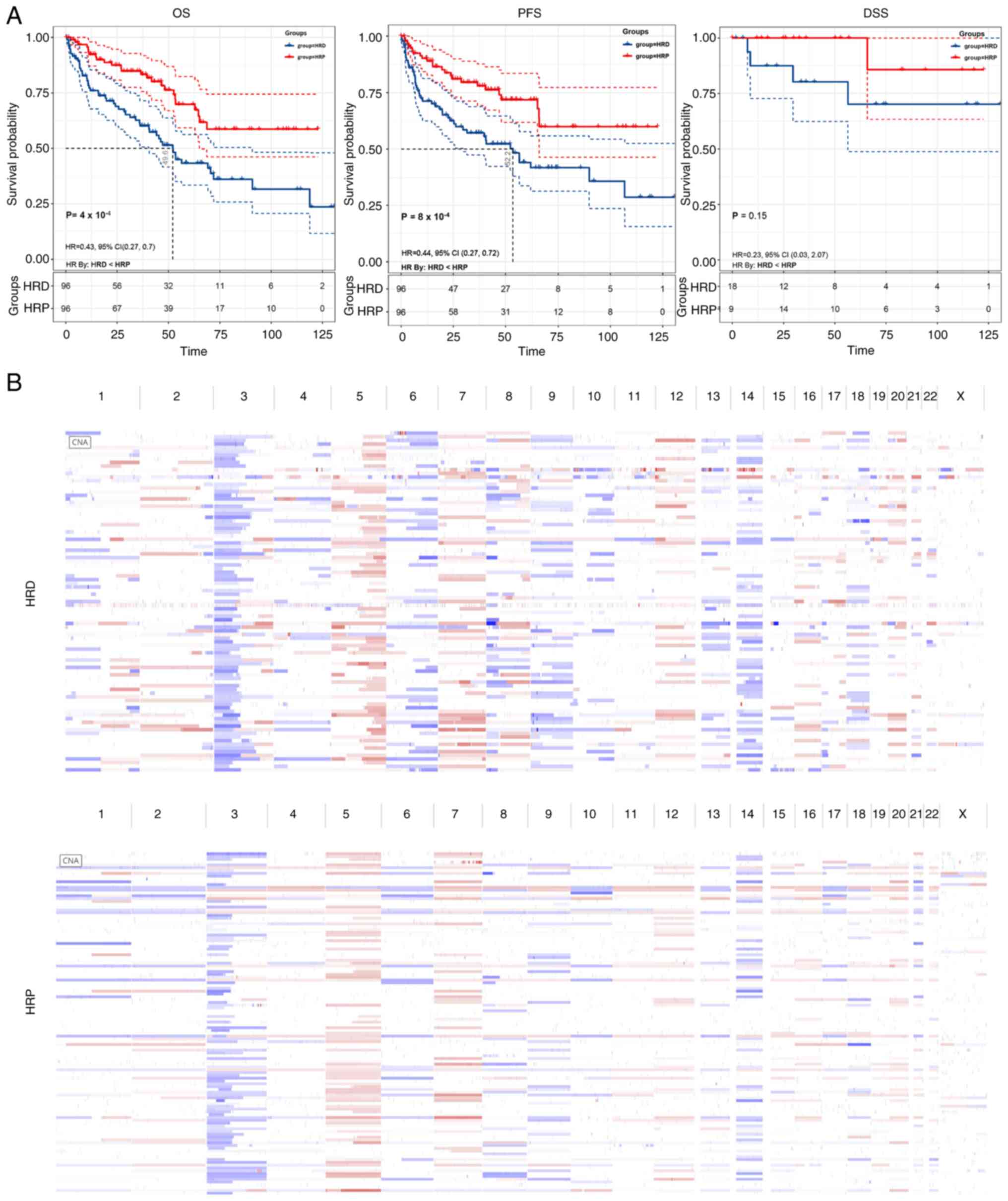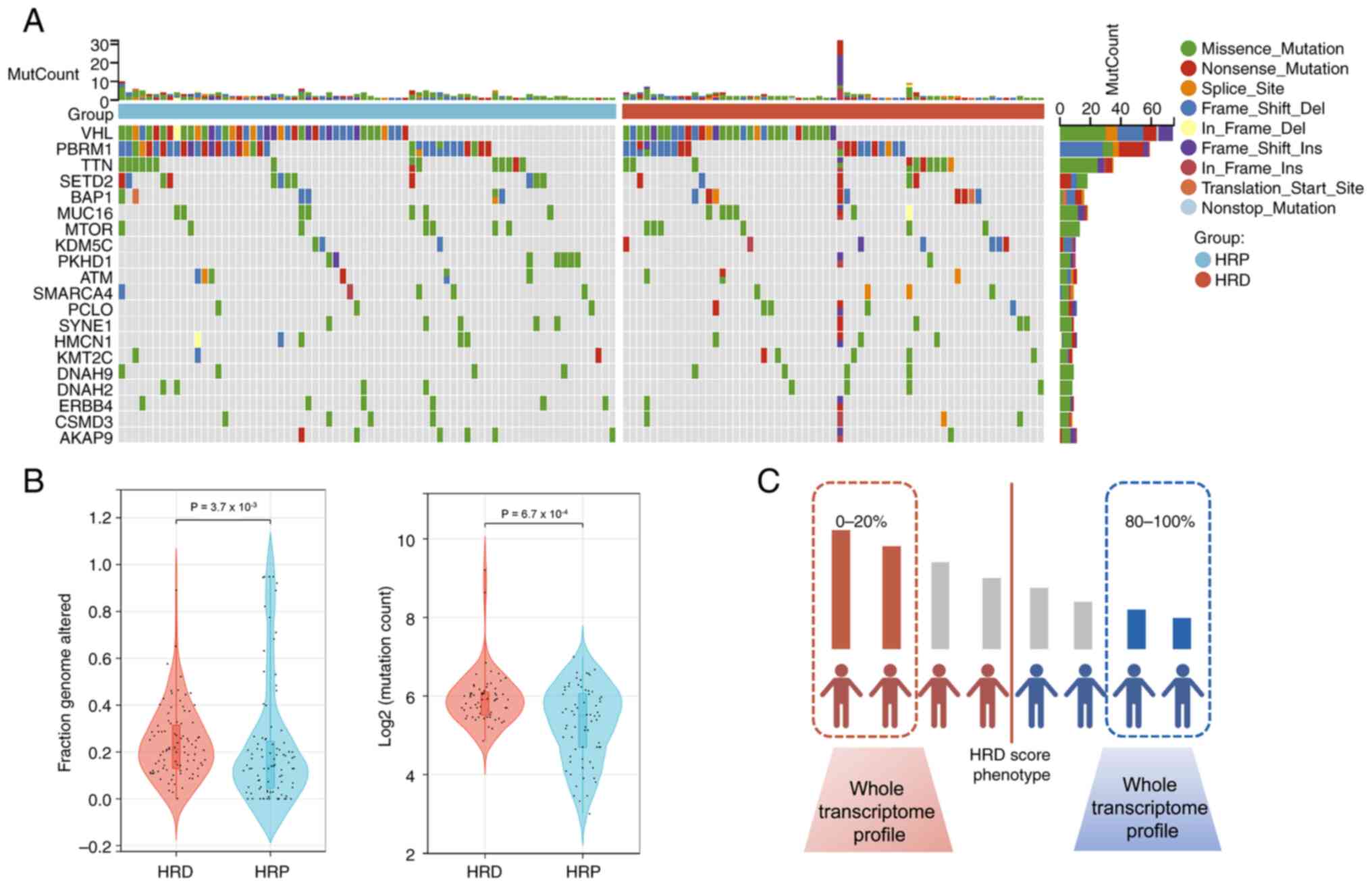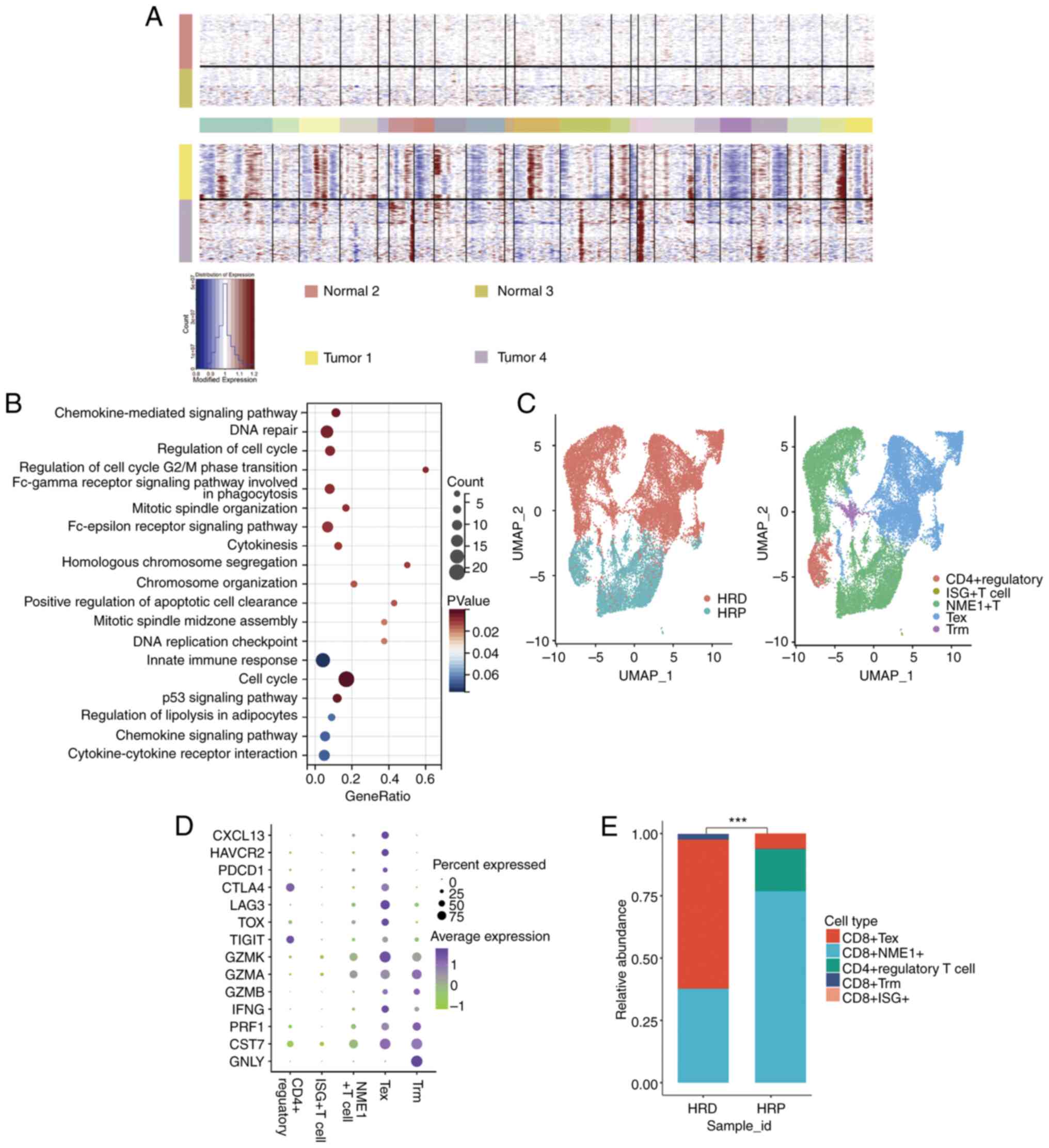|
1
|
Hsieh JJ, Purdue MP, Signoretti S, Swanton
C, Albiges L, Schmidinger M, Heng DY, Larkin J and Ficarra V: Renal
cell carcinoma. Nat Rev Dis Primers. 3(17009)2017.PubMed/NCBI View Article : Google Scholar
|
|
2
|
Sanchez DJ and Simon MC: Genetic and
metabolic hallmarks of clear cell renal cell carcinoma. Biochim
Biophys Acta Rev Cancer. 1870:23–31. 2018.PubMed/NCBI View Article : Google Scholar
|
|
3
|
Lobo J, Ohashi R, Amin MB, Berney DM,
Compérat EM, Cree IA, Gill AJ, Hartmann A, Menon S, Netto GJ, et
al: The WHO 2022 landscape of papillary and chromophobe renal cell
carcinoma. Histopathology. 81:426–438. 2022.PubMed/NCBI View Article : Google Scholar
|
|
4
|
Choueiri TK and Motzer RJ: Systemic
therapy for metastatic renal-cell carcinoma. N Eng J Med.
376:354–366. 2017.PubMed/NCBI View Article : Google Scholar
|
|
5
|
Makhov P, Joshi S, Ghatalia P, Kutikov A,
Uzzo RG and Kolenko VM: Resistance to systemic therapies in clear
cell renal cell carcinoma: Mechanisms and management strategies.
Mol Cancer Ther. 17:1355–1364. 2018.PubMed/NCBI View Article : Google Scholar
|
|
6
|
Hsieh JJ, Le VH, Oyama T, Ricketts CJ, Ho
TH and Cheng EH: Chromosome 3p loss-orchestrated VHL, HIF and
epigenetic deregulation in clear cell renal cell carcinoma. J Clin
Oncol. 36(JCO2018792549)2018.PubMed/NCBI View Article : Google Scholar
|
|
7
|
Liao L, Liu ZZ, Langbein L, Cai W, Cho EA,
Na J, Niu X, Jiang W, Zhong Z, Cai WL, et al: Multiple tumor
suppressors regulate a HIF-dependent negative feedback loop via
ISGF3 in human clear cell renal cancer. Elife.
7(e37925)2018.PubMed/NCBI View Article : Google Scholar
|
|
8
|
De Cubas AA and Rathmell WK: Epigenetic
modifiers: Activities in renal cell carcinoma. Nat Rev Urol.
15:599–614. 2018.PubMed/NCBI View Article : Google Scholar
|
|
9
|
Ledermann JA, Drew Y and Kristeleit RS:
Homologous recombination deficiency and ovarian cancer. Eur J
Cancer. 60:49–58. 2016.PubMed/NCBI View Article : Google Scholar
|
|
10
|
Shi Z, Zhao Q, Lv B, Qu X, Han X, Wang H,
Qiu J and Hua K: Identification of biomarkers complementary to
homologous recombination deficiency for improving the clinical
outcome of ovarian serous cystadenocarcinoma. Clin Transl Med.
11(e399)2021.PubMed/NCBI View
Article : Google Scholar
|
|
11
|
Marquard AM, Eklund AC, Joshi T,
Krzystanek M, Favero F, Wang ZC, Richardson AL, Silver DP, Szallasi
Z and Birkbak NJ: Pan-cancer analysis of genomic scar signatures
associated with homologous recombination deficiency suggests novel
indications for existing cancer drugs. Biomark Res. 3:1–10.
2015.PubMed/NCBI View Article : Google Scholar
|
|
12
|
Telli ML, Timms KM, Reid J, Hennessy B,
Mills GB, Jensen KC, Szallasi Z, Barry WT, Winer EP, Tung NM, et
al: Homologous recombination deficiency (HRD) score predicts
response to platinum-containing neoadjuvant chemotherapy in
patients with triple-negative breast cancerHRD predicts response to
platinum therapy in TNBC. Clin Cancer Res. 22:3764–3773.
2016.PubMed/NCBI View Article : Google Scholar
|
|
13
|
Sztupinszki Z, Diossy M, Krzystanek M,
Reiniger L, Csabai I, Favero F, Birkbak NJ, Eklund AC, Syed A and
Szallasi Z: Migrating the SNP array-based homologous recombination
deficiency measures to next generation sequencing data of breast
cancer. NPJ Breast Cancer. 4(16)2018.PubMed/NCBI View Article : Google Scholar
|
|
14
|
Takaya H, Nakai H, Takamatsu S, Mandai M
and Matsumura N: Homologous recombination deficiency status-based
classification of high-grade serous ovarian carcinoma. Sci Rep.
10(2757)2020.PubMed/NCBI View Article : Google Scholar
|
|
15
|
Timms KM, Abkevich V, Hughes E, Neff C,
Reid J, Morris B, Kalva S, Potter J, Tran TV, Chen J, et al:
Association of BRCA1/2 defects with genomic scores predictive of
DNA damage repair deficiency among breast cancer subtypes. Breast
Cancer Res. 16(475)2014.PubMed/NCBI View Article : Google Scholar
|
|
16
|
Shi Z, Shen J, Qiu J, Zhao Q, Hua K and
Wang H: CXCL10 potentiates immune checkpoint blockade therapy in
homologous recombination-deficient tumors. Theranostics.
11(7175)2021.PubMed/NCBI View Article : Google Scholar
|
|
17
|
Merino DM, McShane LM, Fabrizio D, Funari
V, Chen SJ, White JR, Wenz P, Baden J, Barrett JC, Chaudhary R, et
al: Establishing guidelines to harmonize tumor mutational burden
(TMB): In silico assessment of variation in TMB quantification
across diagnostic platforms: Phase I of the friends of cancer
research TMB harmonization project. J Immunother Cancer.
8(e000147)2020.PubMed/NCBI View Article : Google Scholar
|
|
18
|
Gainor JF, Rizvi H, Jimenez Aguilar E,
Skoulidis F, Yeap BY, Naidoo J, Khosrowjerdi S, Mooradian M, Lydon
C, Illei P, et al: Clinical activity of programmed cell death 1
(PD-1) blockade in never, light and heavy smokers with
non-small-cell lung cancer and PD-L1 expression ≥ 50%. Ann Oncol.
31:404–411. 2020.PubMed/NCBI View Article : Google Scholar
|
|
19
|
Niu B, Ye K, Zhang Q, Lu C, Xie M,
McLellan MD, Wendl MC and Ding L: MSIsensor: microsatellite
instability detection using paired tumor-normal sequence data.
Bioinformatics. 30:1015–1016. 2014.PubMed/NCBI View Article : Google Scholar
|
|
20
|
Tomczak K, Czerwińska P and Wiznerowicz M:
Review the cancer genome atlas (TCGA): An immeasurable source of
knowledge. Contemp Oncol (Pozn). 2015:A68–A77. 2015.PubMed/NCBI View Article : Google Scholar
|
|
21
|
Koboldt DC, Zhang Q, Larson DE, Shen D,
McLellan MD, Lin L, Miller CA, Mardis ER, Ding L and Wilson RK:
VarScan 2: Somatic mutation and copy number alteration discovery in
cancer by exome sequencing. Genome Res. 22:568–576. 2012.PubMed/NCBI View Article : Google Scholar
|
|
22
|
Wang K, Li M and Hakonarson H: ANNOVAR:
Functional annotation of genetic variants from high-throughput
sequencing data. Nucleic Acids Res. 38(e164)2010.PubMed/NCBI View Article : Google Scholar
|
|
23
|
Gao J, Aksoy BA, Dogrusoz U, Dresdner G,
Gross B, Sumer SO, Sun Y, Jacobsen A, Sinha R, Larsson E, et al:
Integrative analysis of complex cancer genomics and clinical
profiles using the cBioPortal. Sci Signal. 6(pl1)2013.PubMed/NCBI View Article : Google Scholar
|
|
24
|
Au L, Hatipoglu E, Robert de Massy M,
Litchfield K, Beattie G, Rowan A, Schnidrig D, Thompson R, Byrne F,
Horswell S, et al: Determinants of anti-PD-1 response and
resistance in clear cell renal cell carcinoma. Cancer Cell.
39:1497–1518.e11. 2021.PubMed/NCBI View Article : Google Scholar
|
|
25
|
Abkevich V, Timms KM, Hennessy BT, Potter
J, Carey MS, Meyer LA, Smith-McCune K, Broaddus R, Lu KH, Chen J,
et al: Patterns of genomic loss of heterozygosity predict
homologous recombination repair defects in epithelial ovarian
cancer. Br J Cancer. 107:1776–1782. 2012.PubMed/NCBI View Article : Google Scholar
|
|
26
|
Popova T, Manié E, Rieunier G,
Caux-Moncoutier V, Tirapo C, Dubois T, Delattre O, Sigal-Zafrani B,
Bollet M, Longy M, et al: Ploidy and large-scale genomic
instability consistently identify basal-like breast carcinomas with
BRCA1/2 inactivation. Cancer Res. 72:5454–5462. 2012.PubMed/NCBI View Article : Google Scholar
|
|
27
|
Birkbak NJ, Wang ZC, Kim JY, Eklund AC, Li
Q, Tian R, Bowman-Colin C, Li Y, Greene-Colozzi A, Iglehart JD, et
al: Telomeric allelic imbalance indicates defective DNA repair and
sensitivity to DNA-damaging agents. Cancer Discov. 2:366–375.
2012.PubMed/NCBI View Article : Google Scholar
|
|
28
|
Love MI, Huber W and Anders S: Moderated
estimation of fold change and dispersion for RNA-seq data with
DESeq2. Genome Biol. 15(550)2014.PubMed/NCBI View Article : Google Scholar
|
|
29
|
Subramanian A, Tamayo P, Mootha VK,
Mukherjee S, Ebert BL, Gillette MA, Paulovich A, Pomeroy SL, Golub
TR, Lander ES and Mesirov JP: Gene set enrichment analysis: A
knowledge-based approach for interpreting genome-wide expression
profiles. Proc Natl Acad Sci USA. 102:15545–15550. 2005.PubMed/NCBI View Article : Google Scholar
|
|
30
|
McGinnis CS, Murrow LM and Gartner ZJ:
DoubletFinder: Doublet detection in single-cell RNA sequencing data
using artificial nearest neighbors. Cell Syst. 8:329–337.e4.
2019.PubMed/NCBI View Article : Google Scholar
|
|
31
|
Korsunsky I, Millard N, Fan J, Slowikowski
K, Zhang F, Wei K, Baglaenko Y, Brenner M, Loh PR and Raychaudhuri
S: Fast, sensitive and accurate integration of single-cell data
with Harmony. Nat Methods. 16:1289–1296. 2019.PubMed/NCBI View Article : Google Scholar
|
|
32
|
Ianevski A, Giri AK and Aittokallio T:
Fully-automated and ultra-fast cell-type identification using
specific marker combinations from single-cell transcriptomic data.
Nature Commun. 13(1246)2022.PubMed/NCBI View Article : Google Scholar
|
|
33
|
Li X and Wang CY: From bulk, single-cell
to spatial RNA sequencing. Int J Oral Sci. 13(36)2021.PubMed/NCBI View Article : Google Scholar
|
|
34
|
Poznansky MC, Olszak IT, Foxall R, Evans
RH, Luster AD and Scadden DT: Active movement of T cells away from
a chemokine. Nat Med. 6:543–548. 2000.PubMed/NCBI View
Article : Google Scholar
|
|
35
|
Greener JG, Kandathil SM, Moffat L and
Jones DT: A guide to machine learning for biologists. Nat Rev Mol
Cell Biol. 23:40–55. 2022.PubMed/NCBI View Article : Google Scholar
|
|
36
|
Alhmoud JF, Woolley JF, Al Moustafa AE and
Malki MI: DNA damage/repair management in cancers. Cancers (Basel).
12(1050)2020.PubMed/NCBI View Article : Google Scholar
|
|
37
|
Wang Y, Yan K, Wang L and Bi J: Genome
instability-related long non-coding RNA in clear renal cell
carcinoma determined using computational biology. BMC Cancer.
21:1–13. 2021.PubMed/NCBI View Article : Google Scholar
|
|
38
|
Niu S, Liu K, Xu Y, et al: Genomic
landscape of Chinese clear cell renal cell carcinoma patients with
venous tumor thrombus identifies chromosome 9 and 14 deletions and
related immunosuppressive microenvironment. Front Oncol.
11(646338)2021.PubMed/NCBI View Article : Google Scholar
|
|
39
|
Fakouri NB, Hou Y, Demarest TG,
Christiansen LS, Okur MN, Mohanty JG, Croteau DL and Bohr VA:
Toward understanding genomic instability, mitochondrial dysfunction
and aging. FEBS J. 286:1058–1073. 2019.PubMed/NCBI View Article : Google Scholar
|
|
40
|
Kohli K, Pillarisetty VG and Kim TS: Key
chemokines direct migration of immune cells in solid tumors. Cancer
Gene Ther. 29:10–21. 2022.PubMed/NCBI View Article : Google Scholar
|
|
41
|
Dangaj D, Bruand M, Grimm AJ, Ronet C,
Barras D, Duttagupta PA, Lanitis E, Duraiswamy J, Tanyi JL,
Benencia F, et al: Cooperation between constitutive and inducible
chemokines enables T cell engraftment and immune attack in solid
tumors. Cancer Cell. 35:885–900.e10. 2019.PubMed/NCBI View Article : Google Scholar
|
|
42
|
Mollica Poeta V, Massara M, Capucetti A
and Bonecchi R: Chemokines and chemokine receptors: New targets for
cancer immunotherapy. Front Immunol. 10(379)2019.PubMed/NCBI View Article : Google Scholar
|
|
43
|
Lowery FJ, Krishna S, Yossef R, Parikh NB,
Chatani PD, Zacharakis N, Parkhurst MR, Levin N, Sindiri S, Sachs
A, et al: Molecular signatures of antitumor neoantigen-reactive T
cells from metastatic human cancers. Science. 375:877–884.
2022.PubMed/NCBI View Article : Google Scholar
|
|
44
|
Zheng C, Fass JN, Shih YP, Gunderson AJ,
Sanjuan Silva N, Huang H, Bernard BM, Rajamanickam V, Slagel J,
Bifulco CB, et al: Transcriptomic profiles of neoantigen-reactive T
cells in human gastrointestinal cancers. Cancer Cell.
40:410–423.e17. 2022.PubMed/NCBI View Article : Google Scholar
|



















